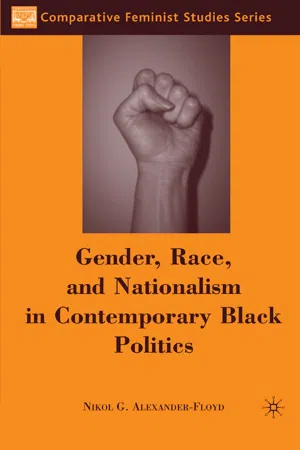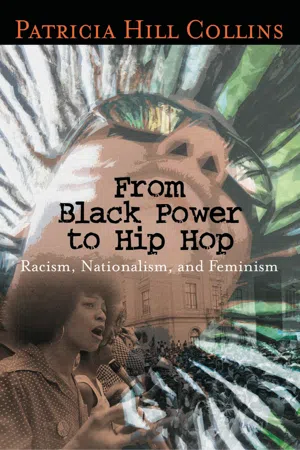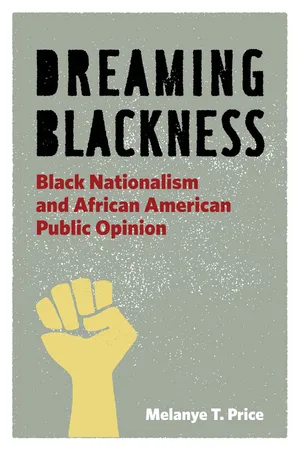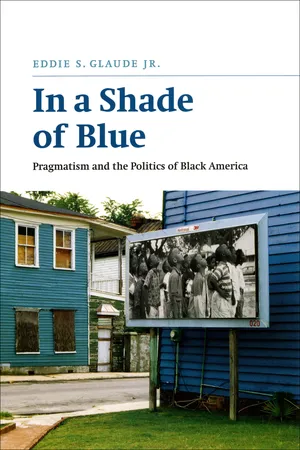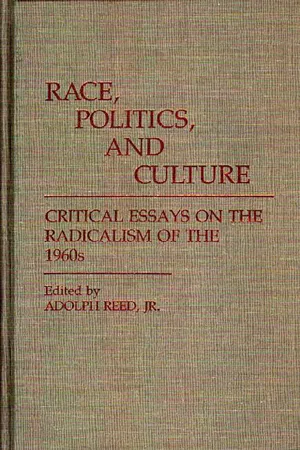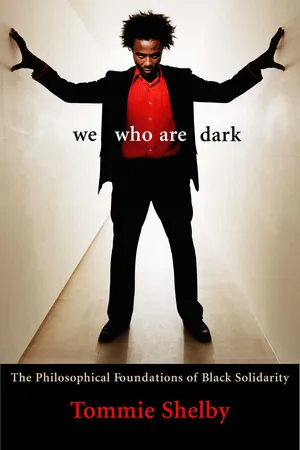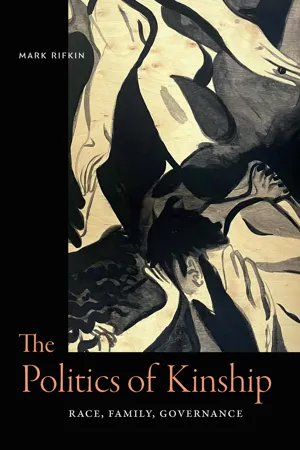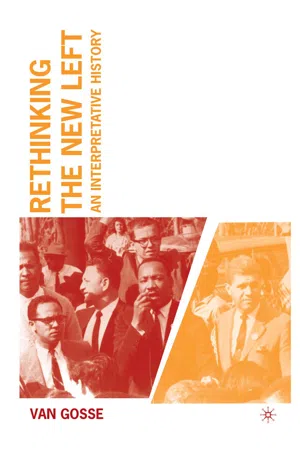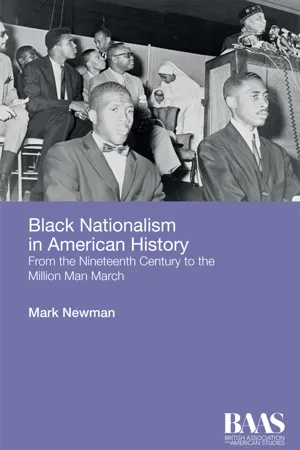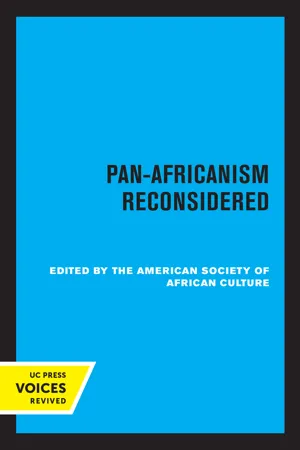Politics & International Relations
Black Nationalism
Black Nationalism is a political and social movement advocating for the establishment of a separate black nation. It emphasizes the need for self-determination, economic empowerment, and cultural pride within the black community. Black Nationalism has historically sought to challenge systemic racism and oppression, promoting solidarity and autonomy for people of African descent.
Written by Perlego with AI-assistance
Related key terms
1 of 5
10 Key excerpts on "Black Nationalism"
- N. Alexander-Floyd(Author)
- 2007(Publication Date)
- Palgrave Macmillan(Publisher)
Introduction Whether through the Million Man March, various forms of rap music, or economic programs for self-empowerment, Black Nationalism remains an important, thriving ideology within Black politics. Scholars in history, cultural studies, literature, and other fields have worked to understand and assess the appeal and influence of Black Nationalism, both historically in terms of the Black Power movement, and in terms of its connection to contemporary politics. 1 In the field of political science, literature on Black politics traditionally tends to deal with nationalism within a limited frame: as the polar opposite of integra- tionism, the ideology considered to be the other main tendency within Black politics. 2 Most recently scholars in political science such as Robert Brown, Ronald Brown, Darren Davis, Michael Dawson, and Todd Shaw have worked to discern whether and to what extent there are various types or “dimensions” of Black Nationalism. 3 Generally scholars have labored to delineate the defining characteristics of vari- ous nationalist traditions, but have neglected to include masculinist gender power—that is the exercise of influence and control by men to delineate institutional boundaries, establish patterns of leadership, and produce identity—as a key component. 4 Moreover, much of the recent scholarship on Black Nationalisms, particularly related to the Black Power era, has been celebratory, excluding critical consideration of gender as it operates to produce identity, to ground ideology, or to inform leadership structures, goals, or dynamics. Indeed, this scholarship on Black Nationalisms is marked by what Eddie S. Glaude, Jr. describes as a “nationalist historiography” of 1960s Black Nationalism.- eBook - PDF
From Black Power to Hip Hop
Racism, Nationalism, and Feminism
- Patricia Hill Collins(Author)
- 2006(Publication Date)
- Temple University Press(Publisher)
Despite considerable variability in how African Americans understand and ar-ticulate Black nationalist ideology, I suggest that Black Nationalism’s main ideas of self-definition, self-determination, and self-reliance res-onate with the experiences of large numbers of African Americans and with important cultural norms of American society. In this context, the core ideas of Black Nationalism can be used to craft an African Amer-ican racial/ethnic identity that in turn articulates with historical models of ethnic political mobilization used by other racial/ethnic groups. 6 75 My argument constitutes a major departure from standard ap-proaches to Black Nationalism. Most scholarship defines Black Nationalism as a political ideology, one of many (e.g., socialism or in-tegrationism) that historically have framed African American politics. 7 Such approaches further categorize the philosophical distinctions among Black Nationalisms. Cultural nationalism, revolutionary na-tionalism, religious nationalism, Black feminist nationalism, and the like have all been classified as diverse strands of an overarching Black nationalist philosophy. 8 This approach, while valuable, remains lim-ited, because it ignores how African Americans may use Black na-tionalist ideology to meet the challenges of contemporary racism. For example, despite social-class differences among African Americans that might catalyze differential voting patterns, African Americans continue to vote along racial lines. 9 Moreover, focusing on ideological strands of Black Nationalism also obscures how African Americans may use its core ideas as a system of meaning. Black Nationalism can be used to organize social institutions and social relations within African Ameri-can communities as well as African American group behavior within American society. - eBook - ePub
Dreaming Blackness
Black Nationalism and African American Public Opinion
- Melanye T. Price(Author)
- 2009(Publication Date)
- NYU Press(Publisher)
6Black Nationalism and Its Consequences
Mobilization around Black Nationalism has almost always paralleled organization building and an attempt at developing an intraracial infrastructure. Whether it was through the organized African expeditions supported by black separatists in the 1850s and 1860s, Garvey’s Universal Negro Improvement Association (UNIA) in the 1920s, or the Republic of New Africa in 1970s, Black Nationalists have mobilized ordinary citizens around ideals that are heavily coupled with focused action. Additionally, because of its focus on demonstrating and practicing self-reliance, self-help, and self-determination, Black Nationalism is equal parts ideology and action plan. Therefore, African American subscription to Black Nationalism should be borne out in Black Nationalists’ political behavior, as well.Now that we have gained a better sense of the correlates of Black Nationalist support, I turn to a final quantitative goal of this project. I hypothesize that this measure is significantly related to political behavior and that it supports the argument that it is a more accurate predictor of political behavior than conventional measures associated with African American political behavior. This is achieved by creating OLS models of political behavior and attitudes and by switching the Black Nationalist Index from the dependent to the independent side of the equation. Here I take up the task of examining the relationship between Black Nationalism and important political variables, including measures of political alienation, partisanship, participation, and policy.Alienation and Ideology: Analysis of Trust and EfficacyA democracy cannot sustain itself without popular support; consequently, political scholars and practitioners are interested in both understanding and ultimately preventing the growth of political alienation. Miller (1974) argued that the level of political alienation can be measured along two dimensions—political trust and political efficacy. High levels of political alienation, it was believed, led to increased political tension and reliance on unconventional forms of political expression (Aberbach and Walker 1970b). This was a popular explanation proffered for such widespread support for previously unorthodox political protest in the sixties and seventies. In opposition to conventional wisdom, Pollock (1983) argues that “an increase in cynical perceptions . . . does not necessarily imply an increased potential for extremist behavior. It may, however, imply a change in patterns of conventional participant activity” (406–407). Instead he finds that “politically competent cynical individuals favor high initiative modes of influence—campaigning and contacting as well as protest behavior.” - eBook - PDF
In a Shade of Blue
Pragmatism and the Politics of Black America
- Eddie S. Glaude, Eddie S. Glaude, Jr.(Authors)
- 2008(Publication Date)
- University of Chicago Press(Publisher)
6 And any of these views of Black Nationalism can be thought of in economic, political, and cultural terms. Let me offer an example of this particular problem of definition. Wil-son J. Moses, one of the more insightful scholars of Black Nationalism in the United States, defines Black Nationalism according to established cri-teria for defining nationalisms generally. He argues in the introduction to Classical Black Nationalism: From the American Revolution to Marcus Garvey that Black Nationalism in the period between 1850 and 1925 “may be defined as the effort of African Americans to create a sovereign nation-state and for-mulate an ideological basis for a concept of a national culture.” 7 Attempts to define Black Nationalism as simply the development of sentiments of unity among peoples of African descent in the United States will fail, he maintains, precisely because such views are too broad to be meaningful. Rather, “The essential feature of classical Black Nationalism is its goal of creating a black nation-state or empire with absolute control over a specific geographical territory, and sufficient economic and military power to defend it.” 8 Moses provides what might be called a strict definition of black nation-alism. For a political practice to be appropriately described as an example of Black Nationalism, it must meet, in his view, certain necessary and suf-ficient conditions. The goal of possessing a sovereign state, for example, is a sufficient condition, a position consistent with standard accounts of Eu-ropean nationalism. This goal might presuppose a particular conception of the racial self in which group members presume a common history, be-liefs, and kinship that substantiate their claim to constitute a separate Explicating Black Nationalism 115 and distinct people entitled to possession of a self-governing state. In fact, Moses deems this second point a distinctive feature of nationalisms in general. - eBook - PDF
Race, Politics, and Culture
Critical Essays on the Radicalism of the 1960s
- Adolph Reed Jr.(Author)
- 1986(Publication Date)
- Praeger(Publisher)
Yet, while militant Black Nationalism developed as a reaction to the assimilationist approach of the Civil Rights movement, it envisioned an obsolete, folkish model of black life. This yearning was hypostatized to the level of a vague "black culture"—a romantic retrieval of a vanishing black particularity. This vision of black culture, of course, was grounded in residual features of black rural life prior to migrations to the North. They were primarily cultural patterns that had once been enmeshed in a life world knitted together by kinship, voluntary association, and production within a historical context of rural racial domination. As that life world disinte- grated before urbanization and mass culture, Black Nationalism sought to reconstitute it. 39 In that sense, the nationalist elaboration of Black Power was naive both in that it was not sufficiently self-conscious and that it mistook artifacts and idiosyncrasies of culture for its totality and froze them into an ahistorical rhetoric of authenticity. Two consequences followed. First, 74 Black Political and Cultural Radicalism abstracted from its concrete historical context, black culture lost its dy- namism and took on the commodity form (e.g., red, black, and green flags; dashikis; Afro-Sheen; "blaxploitation" films; collections of bad poetry). Second, while ostensibly politicizing culture by defining it as an arena for conflict, Black Nationalism actually depoliticized the move- ment inasmuch as the reified nationalist framework could relate to the present only through a simplistic politics of unity. 40 Hence, it forfeited hegemony over political programs to the best organized element in the black community: the administrative elite. In this fashion, black culture became a means of legitimation of the elite's political hegemony. "Black culture" posited a functionalist, perfectly integrated black so- cial order which was then projected backward through history as the Truth of black existence. - eBook - PDF
We Who Are Dark
The Philosophical Foundations of Black Solidarity
- Tommie Shelby(Author)
- 2009(Publication Date)
- Belknap Press(Publisher)
3 Black Power Nationalism The concept of Black Power rests on a fundamental premise: Before a group can enter the open society, it must first close ranks. By this we mean that group solidarity is necessary be-fore a group can operate effectively from a bargaining posi-tion of strength in a pluralistic society. —Stokely Carmichael and Charles Hamilton, Black Power (1967) This right of self-determination has always been denied. It is a right which blacks have always fought for. The first black newspaper in America [ Freedom’s Journal ] published its first edition on May 16, 1827. In its lead editorial, it stated, “We wish to plead our own cause. Too long have others spoken for us.” —Julius Lester, Look Out Whitey! Black Power’s Gon’ Get Your Mama! (1968) The vast majority of African Americans do not favor forming a sep-arate black nation-state. 1 Despite their justified grievances, they generally recognize the United States as their home. Of course, many do have ambivalence, and at times hostility, toward their country. They have become disillusioned with some of their na-tion’s more lofty ideals or, rather, by the failure of their government and compatriots to live up to them. 2 Given the historical experience of blacks in America and the persistence of racism, this ambiva-lence should hardly be surprising. Though these sentiments rarely translate into a desire to expatriate, the idea of group self-determi-nation still resonates among African Americans. Many desire not simply to enhance their autonomy and political influence as indi-vidual citizens, but to increase their independence and political em-powerment as a group, to move toward a form of collective self-rule less radical than a separate sovereign republic. - eBook - PDF
The Politics of Kinship
Race, Family, Governance
- Mark Rifkin(Author)
- 2024(Publication Date)
- Duke University Press Books(Publisher)
four Blackness, Criminality, Governance in her field-changing essay “Black Nationalism and Black Com- mon Sense,” Wahneema Lubiano argues that “Black Nationalism” has functioned as “black American common sense,” suggesting that “its circu- lation has acted both as a bulwark against racism and as disciplinary ac- tivity within the group.” Given that Black people in the United States, in “their ‘being-as-a-group,’ ” have not controlled the means of production or a clear territorial space, and did not until the 1960s engage in “meaningful participation in formal public politics,” Lubiano indicates that “culture has been our terrain of struggle.” However, the cultural work of Black nation- alism, she suggests, has not operated outside the terms of the state but in complex dialectical relation with them: “Even as it functions as resistance to the state on one hand, it reinscribes the state in particular places within its own narratives of resistance. That reinscription most often occurs within black nationalist narratives of the black family.” 1 Lubiano critiques such nationalist framings for the ways they normalize heterogendered and privatizing notions of family, themselves largely imposed by the state (as elaborated in the previous chapter), as the infrastructural basis for what presents itself as an oppositional imaginary. Even as Black Nationalism marks and contests the racialized and racializing character of US political economy, the distinctions, in Lewis Henry Morgan’s terms (discussed in chapter 1), between “domestic institutions” and “political society” persist. In this way, such nationalism remains in the orbit of the very state forms 200 · chaPter four it would seek to contest, raising questions about the potential for concep- tions of governance to incubate or speak to alternative social forms. - eBook - PDF
Rethinking the New Left
An Interpretative History
- V. Gosse(Author)
- 2016(Publication Date)
- Palgrave Macmillan(Publisher)
the building of separate black institutions and a liberated black consciousness based in African identity. For cultural nationalists, capitalism and socialism were both European concepts irrelevant to the black world they would build. They were the heirs of Marclls Garvey, though they too claimed Malcolm X's legacy, emphasizing, however, his espousal of IOta l autonomy and black self-worth rather than his support for revolutionary internationalism late in life. It would be a mistake. however, to stress a rigid dividing line between these two philosophies. Outside of core groups like Karenga's US and the 122 I THE nw LtrT Panthers, which denounced each other vociferously, many independent local groups assimilated both the revolutionary and the cultural approaches to nationalism into a rich stew of ideas and organizational experimentation. And there were many other ways to define Black Power, not all of them explicitly nationalist. The "territorial" nationalism of the Republic of New Africa (RNA) took Garvey and the Nation of Islam's call for a separate black homeland literally, and urged a military takeover of the Black Belt in the South to create a new nation for all African Americans. Though a group of RNA activists moved to Mississippi, declared the new nation, and defended their turf against local police, they ultimately had little success. At the other end of the spectrum, various would-be entrepreneurs and political operators, including CORE National Director Floyd McKissick, argued that the only real form of power in America was economic, and that required the development of a black capitalism. They received support from Republican presidential candi- date Richard Nixon, who endorsed Black Power on those terms in 1968. - eBook - PDF
Black Nationalism in American History
From the Nineteenth Century to the Million Man March
- Mark Newman(Author)
- 2018(Publication Date)
- Edinburgh University Press(Publisher)
However, Black Nationalism in America was far more extensive than the NOI’s membership, and the mid-1990 s saw far more African Americans supporting black nationalist ideas than had ever done during the black nationalist resurgence of the 1960 s. Not for distribution or resale. For personal use only. Black Nationalism, 1971–1995 177 Black Nationalism in its various forms was also stronger in the black middle and upper class than the lower class, and it mostly took cul-tural forms rather than politically activist ones. 37 Notes 1 . Tunde Adeleke, ‘Black Americans and Africa: A Critique of the Pan-African and Identity Paradigms’, International Journal of African Historical Studies 31 (October 1998 ), p. 509 . 2 . James A. Geschwender, ‘The League of Revolutionary Black Workers: Problems Confronting Black Marxist-Leninist Organizations’, Journal of Ethnic Studies 2 (Fall 1974 ), p. 12 . 3 . Joshua Bloom and Waldo E. Martin, Jr, Black against Empire: The History and Politics of the Black Panther Party (Berkeley, Los Angeles and London: University of California Press, 2013 ), pp. 354 – 80 . 4 . Chokwe Lumumba, ‘Short History of the U.S. War on the R.N.A.’, Black Scholar 12 (January–February 1981 ), pp. 72 – 80 ; ‘The Repression of the RNA’, Black Scholar 3 (October 1971 ), p. 57 ; Donald Cunnigen, ‘Bringing the Revolution Down Home: The Republic of New Africa in Mississippi’, Sociological Spectrum 19 (January–March 1999 ), pp. 74 – 6 . 5 . Cunnigen, ‘Bringing the Revolution Down Home’, pp. 79 – 90 . 6 . Scot Brown, Fighting for US: Maulana Karenga, the US Organization, and Black Cultural Nationalism , with a foreword by Clayborne Carson (New York and London: New York University Press, 2003 ), pp. 120 – 5 . 7 . Robert C. Smith, We Have No Leaders: African Americans in the Post-Civil Rights Era , with a foreword by Ronald C. Waters (Albany: State University of New York Press, 1996 ), pp. - eBook - PDF
- American Society of African Culture(Author)
- 2023(Publication Date)
- University of California Press(Publisher)
P A N - A F R I C A N I S M O R N A T I O N A L I S M I N A F R I C A * D A V I D E . A F T E R Department of Political Science, University of Chicago, J A M E S S . C O L E M A N Department of Political Science, University of California, Los Angeles I . INTRODUCTION Our plan in this paper is a simple one. In addressing ourselves to the political aspects of Pan-Africanism and of nationalism, we shall first provide some overview of the issues that each presents. We shall then proceed to a more detailed analysis of the politics of Africa in order to illustrate some of the dynamism of both the forces of Pan-African- ism and the forces of nationalism. Because the internal and external political factors that shape and affect these two forces are so closely interrelated, we have decided to write this paper jointly. In this way we will be able to illuminate the relationships between Pan-African- ism, or the building of larger African political unities; nationalism, or the building of effective national polities; and international politics, or the relations both between independent African states and between those states and the world at large. Each of these—Pan-Africanism, nationalism, and international politics—has important implications for the others. These are the implications we hope to clarify. Although both Pan-Africanism and nationalism are manifestations of the same general urge toward independence and freedom, they are by no means the same thing. Indeed, the simultaneous effort to create Pan-African political unity and to build effective national societies in Africa creates political paradoxes which, difficult to resolve, may hold the key to Africa's future. Both have in common the objective of politi- • This paper was presented by Professor Coleman. Professor Apter participated in the discussion. Certain events subsequent to the presentation of this paper should be kept in mind. Independence for the Congo has been threatened by regional separation.
Index pages curate the most relevant extracts from our library of academic textbooks. They’ve been created using an in-house natural language model (NLM), each adding context and meaning to key research topics.
